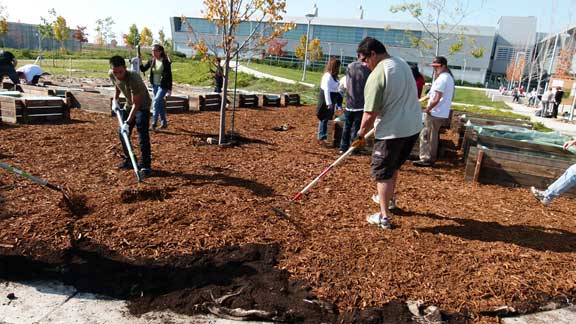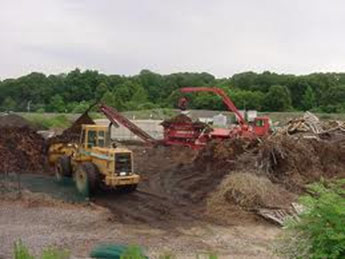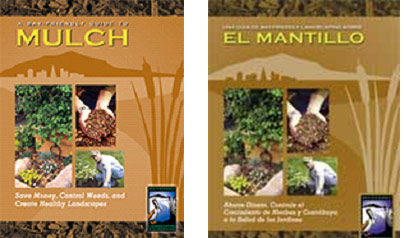This year I’m dedicating Earth Day to mulch. Mulch often takes second place to its organic rival compost in most garden and landscape discussions, but in this edition of The Scoop, mulch moves to #1, and for good reason.
When asked what’s the most cost-effective strategy for improving soil quality, I typically respond with the dual mantras: Compost, compost, compost, and mulch, mulch, mulch. The truth is, mulch should get more of the glory.
Mulch does the heavy “covering” that enables its soil amendment cousin – compost – to feed the soil food web. Though defined simply as a “ground cover,” there’s a lot more to that role than often thought.

Spreading WM EarthCare recycled wood mulch at Ohlone College, Newark, CA.
In these drought-centric times, I recall a 2005 UC Cooperative Extension study on Water Retention and Evaporative Properties of Landscape Mulches by Shaw, Pittenger & McMaster, which found that a 5-inch application of yard waste (green waste) mulch had a mean water holding capacity of 1.13 inches followed by a 3- inch green waste application at 0.63 inches of water. Add to this a documented 35 percent reduction is lost soil moisture, and mulch deserves an Earth Day round of applause.

Creating mulch from greenwaste.
As noted by the California Center for Landscape and Urban Horticulture, selecting permeable mulch that retains water and prevents soil evaporation can significantly reduce the need for irrigation, or eliminate it altogether. Appropriate water-wise mulches include green waste, recycled clean wood from pallets and construction debris, straw, cardboard, burlap, and thick layers of newsprint. Bulk application of recycled wood mulch like that produced by WM EarthCare™ not only improves moisture conditions in your garden or landscape, but also adheres to the Bay-Friendly Landscaping & Gardening Coalition principle of Landscaping for Less to the Landfill (www.bayfriendlycoalition.org). To obtain a free downloadable English or Spanish copy of A Bay-Friendly Landscaper’s Guide to Mulch go to: https://www.bayfriendlycoalition.org/publications.shtml
In addition to improving soil moisture, mulches also play an important role in reducing soil erosion, alleviating soil compaction, and moderating soil temperature. Mulch prevents erosion by reducing the force delivered by rainfall and sprinklers. Alleviating compaction is achieved by creating a mulch cushion between foot or vehicle traffic and the soil surface. This cushion also protects the soil surface from the harsh effects of solar radiation. You can think of mulch as the Dr. Scholl’s for soil. Your soil will be “gellin” with mulch.
Garnering more Earth Day accolades, organic mulches bind heavy metals, reduce weed germination, combat disease, and improve plant establishment.
Hey, could you want one landscape product to do more for the price? I think not.
So celebrate this Earth Day by spreading some mulch, and sharing the wealth about its benefits.
Happy Earth Day!
Mulch! Mulch! Mulch!
The Soil Sommelier
Chalker-Scott, L. 2007. Impact of Mulches on Landscape Plants and the Environment – A Review. J. Environ, Hort. 25(4):239-249.
Shaw, D., Pittenger, D., and M. McMaster. 2005. Water Retention and Evaporative Properties of Landscape Mulches. Proc. 26th Annl. Irrigation Show, Phoenix, AZ, Nov 6-8, 2005.


